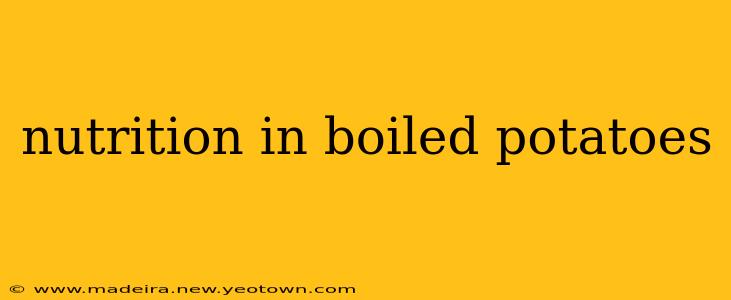The humble boiled potato. Often overlooked, it's a nutritional champion hiding in plain sight. From childhood dinners to sophisticated side dishes, the boiled potato holds a surprisingly rich nutritional profile. Let's peel back the layers (literally!) and explore the benefits of this versatile vegetable.
What are the Nutritional Benefits of Boiled Potatoes?
Boiled potatoes, prepared simply without added fats or oils, are a fantastic source of carbohydrates, providing sustained energy throughout the day. But that’s just the beginning. They're also packed with essential vitamins and minerals, including vitamin C, potassium, and vitamin B6. These nutrients contribute to various bodily functions, from immune system support to nerve function and energy metabolism. The secret lies in retaining these nutrients during the boiling process—a method that often preserves more nutrients compared to frying or roasting.
Are Boiled Potatoes Healthy?
Absolutely! When prepared simply, boiled potatoes are a healthy addition to a balanced diet. However, the healthiness factor is heavily influenced by how you prepare them. Loading them up with butter, sour cream, or excessive salt will drastically alter their nutritional profile, negating many of the benefits. The key is moderation and mindful preparation.
How Many Calories are in a Boiled Potato?
The calorie count in a boiled potato varies depending on its size. A medium-sized boiled potato (about 5.3 ounces) contains roughly 110 calories. This makes it a relatively low-calorie food, especially considering its nutritional density. However, remember that added toppings significantly increase the calorie count.
What Vitamins and Minerals are in Boiled Potatoes?
Boiled potatoes are a treasure trove of essential nutrients:
- Vitamin C: A powerful antioxidant that boosts the immune system.
- Potassium: Essential for maintaining healthy blood pressure.
- Vitamin B6: Crucial for brain development and function.
- Manganese: Important for bone health and metabolism.
- Magnesium: Contributes to muscle and nerve function.
- Fiber: Promotes digestive health.
The specific amounts of these nutrients will vary depending on the potato's size and variety.
Are Boiled Potatoes Good for Weight Loss?
Boiled potatoes can be part of a healthy weight-loss plan. Their high fiber content promotes satiety, keeping you feeling full for longer and potentially reducing overall calorie intake. However, remember portion control is key. And avoid piling on high-calorie toppings.
How to Boil Potatoes to Preserve Nutrients?
The trick to preserving the nutritional value of boiled potatoes lies in minimizing cooking time and avoiding overcooking. Here are some tips:
- Choose the right potato: Russet potatoes are a good option for boiling, as they hold their shape well.
- Scrub, don't peel: The skin contains a significant portion of the potato's nutrients.
- Don't overcook: Boil until tender, but avoid overcooking, which can leach nutrients into the water.
- Cool quickly: Once cooked, quickly cool the potatoes to prevent nutrient degradation.
The Verdict: A Simple Staple with Remarkable Benefits
The boiled potato, when prepared simply and mindfully, is a nutritious and versatile food that deserves a place in your diet. From its substantial carbohydrate content to its rich vitamin and mineral profile, it’s a powerhouse of goodness, often underestimated in its culinary potential. So, next time you're looking for a healthy and satisfying side dish or meal component, remember the humble boiled potato—a nutritional champion in disguise.

